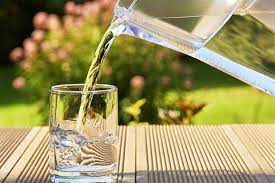To help hydrate the body: The body is hydrated by getting the body enough water to perform its functions properly, and it is known that water is the best natural means of hydrating the body. Mild dehydration or fluid loss of 1% to 3% of your body weight can negatively affect the way your brain works. Not drinking enough water can lead to poor mood, poor concentration, memory, feelings of anxiety and fatigue, and frequent Exposure to headache and the length of its duration.
Regulating body temperature: The water stored in the middle layers of the skin comes out to the surface in the form of sweat when the body heats up, then the sweat is subjected to evaporation on the surface of the skin and cools the body, and some scientists indicated that the low level of water in the body It leads to an increase in heat storage in the body, and the ability to withstand heat stress decreases, so sufficient amounts of water in the body can help reduce physical stress during exercise when heat stress occurs, however there is a need for moreScientific research on these effects.
Improving joint flexibility: The cartilage in joints and spinal discs contains approximately 80% water, and dehydration can lead to a reduced ability to absorb shocks in the long-term, which increases the risk of joint pain. Maintaining the health of the airways: The body restricts the work of the airways when exposed to dehydration, in order to try to reduce the loss of water from the body, which can worsen some health conditions, such as: asthma and allergies.
Availability of nutrients to the body: Many essential nutrients, such as minerals, dissolve in water, so the availability of an adequate amount of water in the body makes it able to deliver nutrients to different parts of the body, and meet their needs.
Reducing flatulence: Flatulence is an uncomfortable health condition, usually It is caused by poor digestion, or increased sodium intake, and is also linked to hormonal fluctuations related to the menstrual cycle in women, and many people believe that drinking good amounts of water should be avoided when bloating, but this belief is incorrect, and that Because water is a natural remedy to help reduce bloating, and drinking a good amount of water throughout the day is essential to help rid the body of waste.
Drink enough water to maintain the integrity of the digestion process, and keep it at a regular and comfortable pace, and the risk of constipation can increase as a result of not consuming sufficient quantities of water, because the water consumed during the day is associated with soluble fiber in the large intestine, which helps to increase the size of stool Reducing the time of its stay in the intestines, facilitating the body’s disposal of waste, and in the absence of sufficient fluids, the body withdraws the water it needs from the stool, which leads to constipation.
Feeling comfortable, which may negatively affect mood, and cause many problems related to itAiding in the formation of saliva: Water is the main component of saliva, in addition to small amounts of electrolytes, mucus, and enzymes, which is a necessary component for breaking down solid foods and maintaining oral health. It is worth noting that the body in general produces enough saliva when Consuming fluids regularly, however saliva production may decrease as a result of advancing age, or taking certain medications, and medical treatments.
Energy, and a study published in The Journal of Clinical Endocrinology & Metabolism in 2003 indicated that drinking 500 milliliters of water helped boost the metabolic rate by 30% in men and women, and the results showed that this effect began within 10 minutes of drinking Help fight disease: A review published in Nutrition Reviews in 2005 indicated that drinking enough water can help reduce the risk of some health conditions. Exercising-induced asthma, urinary tract infection, high blood pressure, urolithiasis, and other health conditions.
, that there is a correlation between increased water drinking and weight loss and fat loss over time, the results showed that drinking water helped promote weight loss in overweight women, so increasing water consumption during a healthy diet and exercise could have a role in losing weight. extra weight
Recommended amounts of water The recommended daily amounts of water to be consumed depend on a number of factors, such as: gender, age, level of physical activity, climate, health status, pregnancy, and breastfeeding. Between 1.5 to 2.5 additional cups of the recommended amount of water, and a higher amount may be needed if you exercise for more than an hour a day, and the following table shows the recommended daily amounts of water from different drinks
Age group Recommended daily amount of water Children 4 to 8 years 5 cups, which equals 1183 milliliters Children 9 to 13 years 7 to 8 cups, equivalent to 1656 to 1892 milliliters Males and females 14 to 18 years 8 to 11 cups Equivalent to 1892 to 2,602 milliliters Men 19 years and over 13 cups, which is equivalent to 3075 milliliters Women 19 years and over 9 cups, equivalent to 2129 milliliters Pregnant 10 cups, equivalent to 2365 milliliters Breastfeeding 13 cups, which is equivalent to 3075 milliliters Drinking a lot of water It is known that every cell of the body needs water to function properly, however, excessive drinking of water can lead to water intoxication, and serious health consequences.
A large amount of poisonous water by accident, but this can happen as a result of excessive drinking during participation in long sporting events, or intense exercise. When a person consumes an excessive amount of water, brain cells begin to swell, and pressure inside the skull increases.
that It causes the initial symptoms of water poisoning.[11] It is worth noting that symptoms usually do not appear until sodium levels in the body drop below 120 mmol per liter, and poisoning can occur without any symptoms, and the initial symptoms of water poisoning include: nausea, which is The most common symptoms are altered mental status, confusion, inappropriate behavior, delusions, poor body coordination, and as sodium levels drop further, and the health condition progresses, the signs and
symptoms of increased intracranial pressure increase dramatically. As a result of an increase in cerebral edema, some vital changes may begin in the body, such as: bradycardia, high pulse pressure, irregular breathing, convulsions, coma, and non-cardiac pulmonary edema. Noncardiogenic pulmonary edema) in some cases, and may reach death when sodium levels drop significantly
Frequently asked questions about when to drink water What are the benefits of drinking water after meals Drinking water after meals can help improve digestion, as water and other fluids help break down food so that the body can absorb nutrients, and water helps make stools softer, which Which reduces the risk of constipation
Drinking water before meals can help reduce appetite levels and consume fewer calories during the day
For more information about the benefits of drinking water before eating, you can read the article on the benefits of drinking water before eating. What are the harms of drinking water with food? There is some information that drinking water with food may reduce stomach acidity, but this information is incorrect, as it has been found that drinking water may help improve the digestion of food.
For more information about the harms of drinking water with food, you can read the article about the dangers of drinking water with food. What are the benefits of drinking water before bed Drinking water before bed may contribute to getting adequate rest and sleep well, as water deprivation can negatively affect mood, which may affect the overall sleep-wake cycle, and drinking warm water before bed Keeps the body hydrated throughout the period of sleep, which can help eliminate toxins and waste from the body
For more information about the benefits of drinking water before bed, you can read the article on the benefits of drinking water before bed. What are the benefits of drinking water on an empty stomach in the morning? Some people can prefer drinking water immediately after waking up, because it makes it easier for them to maintain healthy hydration habits, and increase fluid consumption throughout the day.
Weight loss One of the most important benefits of drinking water on an empty stomach is weight loss, because the body wastes a lot of energy to heat cold water in the digestive system, which speeds up the metabolism in the body, which will contribute to weight loss, and the study showed that drinking 500 milliliters of water increased the rate of 30% metabolism within 10 minutes and sometimes after 30-40 minutes
.Detox
One of the most important benefits of drinking water on an empty stomach is to get rid of toxins in the human body, and the kidneys need water to remove waste from the blood circulation in the body and get rid of it in the form of urine, so doctors advise everyone to drink water on an empty stomach as soon as they wake up from sleep.
Nutrition reveals the danger of replacing water with warm drinks in winter
Washing the intestines Drinking water in the morning contributes to washing and cleansing the intestines and strengthening the human digestive system, because the water enters the empty stomach and works to remove any food residues, thus preventing cases of constipation and poor digestion,
It regulates the work of the digestive system.
Reduce calories
Drinking water before breakfast and eating meals contributes to a short period of feeling full, and not eating large quantities of food, so this habit contributes to reducing the amount of calories entering the human body, and doctors advise drinking water 30 minutes before eating breakfast
Improving brain performance According to scientists, drinking water in the morning helps to improve the mental performance of a person, especially with regard to the processes of remembering, retrieving information, learning new things and gaining mental experiences.
Because warm water plays an important role in breaking down the nutrients that enter the stomach, and helps the stomach muscles to break them down, thus contributing to accelerating the digestion process. Where water works naturally to get rid of waste and other bacteria that may cause infection or disease, especially as it activates the work of the kidneys. Prevents headaches Dehydration and lack of water are considered one of the most important causes of headaches and migraines (migraine),
Drinking plenty of water on an empty stomach will relieve headaches of all kinds. Health of the internal organs One of the most important benefits of drinking water on an empty stomach is that it contributes to the revitalization of the internal organs in the body and improves their performance, gives them regeneration, and maintains the health of the lymphatic system, which plays a major role in balancing fluids Skin Rejuvenation Drinking water in the morning contributes to strengthening the skin and protecting it from dehydration, helping it to regenerate, reducing wrinkles, reducing acne and giving the skin a more vibrant look.
Enhancing energy Drinking water in the morning contributes to enhancing the body’s energy and making a person feel energetic and energetic, because the body consumes a quantity of water at night and not compensated for it makes a person feel tired.


0 Comments